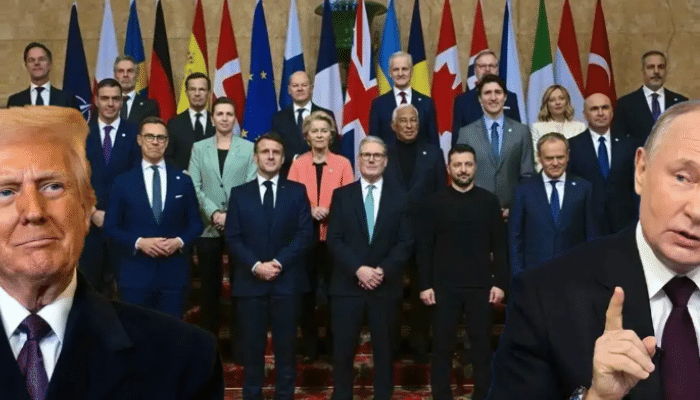
London: European leaders are meeting in London under the banner of the Coalition of the Willing, a UK-led initiative to strengthen global unity against Russia’s invasion of Ukraine. The summit, held at the Foreign, Commonwealth and Development Office (FCDO), brings together leaders and foreign ministers from across Europe and beyond, seeking to coordinate military, financial, and diplomatic measures to choke Moscow’s war machine and secure long-term stability in Eastern Europe.
The meeting — attended both in person and virtually — comes at a crucial moment, as Ukraine braces for another harsh winter offensive and faces mounting challenges in sustaining energy and military resilience amid continued Russian bombardments.
What is the ‘Coalition of the Willing’?
The Coalition of the Willing is an informal but influential alliance of democratic nations determined to maintain unwavering support for Kyiv and tighten restrictions on Russia’s ability to wage war.
According to UK officials, the coalition’s primary goals include:
- Severing Russia’s oil and gas export revenues, which account for roughly 25% of Moscow’s federal budget.
- Closing loopholes that allow Russia to bypass existing sanctions via intermediaries in Asia and the Middle East.
- Accelerating the supply of advanced weapons, including long-range missiles, drones, and air-defence systems.
- Unlocking over $300 billion in frozen Russian sovereign assets to directly fund Ukraine’s reconstruction and defence.
- Strengthening global enforcement mechanisms to track sanctions evasion networks, particularly in shipping and finance.
Officials say the coalition’s framework complements broader sanctions imposed by the United States, European Union, Japan, and Canada, while allowing faster decision-making outside slow multilateral structures.
Why Now?
The timing of the summit is deliberate. Russia has recently intensified strikes on Ukrainian civilian and energy infrastructure, targeting hospitals, schools, and power grids. A deadly missile attack on a nursery in Dnipro, which killed several children this week, has renewed global outrage.
UK Prime Minister Keir Starmer condemned the attack, saying:
“The only person involved in this conflict who does not want to stop the war is President Putin. His depraved strikes on young children in a nursery make that crystal clear.”
Starmer stressed that the UK and its allies are determined to ensure that “aggression cannot be rewarded with silence or fatigue.”
The coalition also aims to counter ‘Ukraine fatigue’ within some European societies, where rising energy prices and election-year politics have begun to test public support for continued aid.
Who’s Attending?
The summit features a mix of in-person and virtual participation from key global leaders:
- Volodymyr Zelenskyy, President of Ukraine
- Keir Starmer, Prime Minister of the United Kingdom
- Mette Frederiksen, Prime Minister of Denmark
- Dick Schoof, Prime Minister of the Netherlands
- Mark Rutte, NATO Secretary General
- Ministers and representatives from Germany, France, Poland, the Baltic States, Canada, Japan, and Australia will join remotely.
Leaders were greeted by pupils of St Mary’s Ukrainian School in London — a symbolic gesture highlighting Britain’s long-standing support for Ukrainian refugees and education programs.
Possible Announcements and Measures
According to diplomatic sources, discussions are focusing on a four-point action plan to further isolate Moscow:
- Energy Crackdown:
- Expanding restrictions on Russian oil and LNG in global markets.
- Working with Gulf countries to stabilize energy prices and prevent supply shocks.
- Weapons and Defence:
- Delivering long-range precision missiles, drones, and upgraded air-defence systems.
- Establishing a joint logistics hub in Poland to streamline arms deliveries.
- Financial Pressure:
- Redirecting frozen Russian central bank assets to Ukraine’s military and humanitarian funds.
- Tightening sanctions on oligarch networks and crypto-based transactions aiding the Kremlin.
- Reconstruction and Energy Resilience:
- Supporting Ukraine’s energy grid repairs, backed by UK firms such as National Grid and Rolls-Royce SMR, which are offering small modular reactor (SMR) technology for sustainable power generation.
UK Accelerates Missile Deliveries
Prime Minister Starmer confirmed that the UK has sped up production and shipment of more than 100 additional air-defence missiles to Ukraine — ahead of schedule.
The weapons package is part of a £1.6 billion bilateral defence deal, supporting over 900 jobs across UK manufacturing, including at Thales Belfast, where production of Lightweight Multirole Missiles (LMMs) has tripled.
Due to increased output, an extra 140 missiles will be delivered in the coming months.
This acceleration underscores Britain’s broader goal of maintaining Ukraine’s air defence capacity throughout the winter, when Russian drone and missile attacks are expected to intensify.
Turning the Financial Screw on Moscow
The summit also highlights coordinated Western efforts to financially squeeze Russia:
- The US recently sanctioned Rosneft and Lukoil, crippling major cash flows to the Kremlin.
- The EU approved its 19th sanctions package, targeting energy revenues, technology transfers, and trade in critical materials.
- The G7 continues to explore mechanisms to reinvest profits from frozen Russian assets, potentially unlocking $50 billion for Ukraine by mid-2026.
Officials emphasise that such steps are “not about punishment, but about accountability and leverage” — aiming to force Moscow back to the negotiating table under credible peace conditions.
The Broader Message
The Coalition’s London summit sends a unified message that Europe and its allies remain steadfast despite global distractions. With the Middle East crisis, US elections, and economic headwinds, Western leaders want to ensure that Ukraine remains “front and centre” of international diplomacy.
As one UK official noted,
“The cost of defending freedom now is far less than the cost of rebuilding a world where aggression goes unchecked.”
